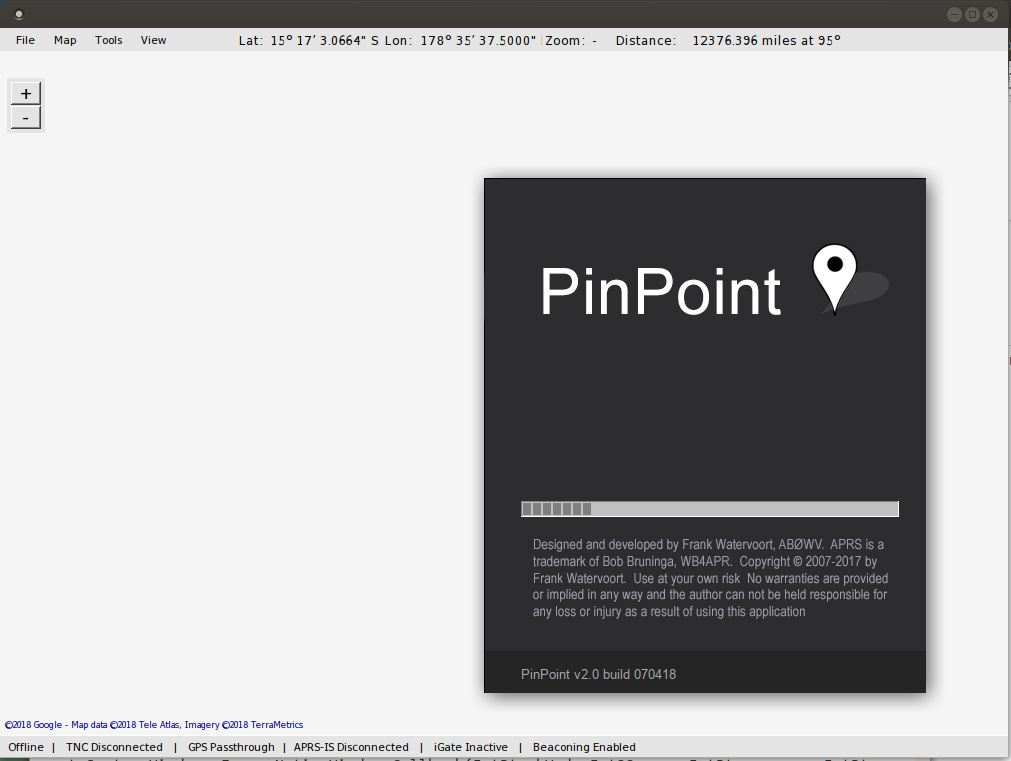

- #Pinpoint aprs download how to
- #Pinpoint aprs download install
- #Pinpoint aprs download zip file
- #Pinpoint aprs download software
- #Pinpoint aprs download code
On the TNC tab, I just picked “network KISS mode.” There are other settting on the other tabs to play with, but these covered it for me. On the APRS tab I filled everything in, but unchecked the box for “Enable APRS Digipeater”, and unchecked the box for “Enable APRS beaconing” because I’m only interested in receving. From the tools and options menu you can set up pretty much everything you need. After downloading and installing per the directions, I fired it up. After a quick search, I decided to do my testing using Pinpoint APRS. Step 4 - Client program, because I am not hardcore. If you’re hardcord though, you don’t even need a client program - you can just read the raw text of the packets, as they will start scrolling by as soon Direwolf hears sounds its recognize as packets. The program will pretty much start listening on whatever sound devices your computer has, and tell you what ‘ports’ you should you should have any client programs listen on. Double clicking that opens up the program in a terminal window. For simplicity sake, I threw a shortcut to direwolf.exe on my desktop.
#Pinpoint aprs download zip file
Following their directions, I downloaded the zip file and unzipped it to a location on my hard drive.

#Pinpoint aprs download install
It was pretty straight-forward to install on my windows laptop.
#Pinpoint aprs download software
There are lots of software sound-modem options, but I went with Direwolf. Step 3 - convert analog FM sounds, into data. From there I just headed to the sound settings on my computer, and while watching the mic level, slowly adjust the volume on the radio, so as to avoid over-driving the mic input. Plug one end of the cable into the headphone jack on the radio, and the other end into the mic port on the usb soundcard. In my case however, I again went with something cheap that I had on hand, since I only needed RX for this part - a little USB sound card, and 3.5mm audio cable. The most common is probably using a sound interface like the venerable signaLink. There are lots of ways to do this, from very basic to very complex. Step 2 - get the signal from the radio to the computer. Since I had that in hand, it’s what I used, but most hams will have an HT, mobile radio, or something similar that can receive signals on their designated APRS freqency (144.39MHz here in the states). When browsing the merch catalog where they can be used, I realized that I enough to get a freebie Whistler WS1010.

In my case, I had recently earned some ‘Shrute Bucks’ at work.
#Pinpoint aprs download how to
Step 1 - Figure out how to receive packets. For my purposes though, it was pretty straightforward to break down into steps what I needed to do, in order to get set up to receive the packets. Its a topic that is both deep and wide, so if you need general information, I’d reccomend starting at.

APRSĪPRS can be a little overwhelming if you’ve never dabbled. We’ll call this the V1 Proof of Concept, as I’m already scheeming for the more permanent version, now that I’ve done some testing. What I have operational right now, as a result, is pretty much a kludged together selection of things I had on hand, freebies, and things that were fairly inexpensive to purchase. To get started with these things, I wanted to play around with stuff I had on hand, as much as possible. This post will focus on the first item - I’ll detail the transcieving via LoRa part of the ground-station in another post.
#Pinpoint aprs download code
Some of the code is also finding it’s way to a github repo. Make sure to check out the Radio-Rocket Tag to find more posts, or check out the summary static pages on the project posted here. Here’s another post with some details on the process of building a model rocket with an electronics package to do some telemetry and messaging via APRS, and LoRa, during a short rocket flight.


 0 kommentar(er)
0 kommentar(er)
